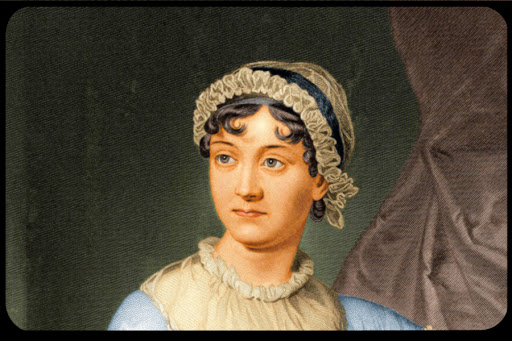The stories have female protagonists, are full of dresses and dancing, have no battle scenes whatsoever, and are wildly popular with women. And yet when our girlfriends want to watch a date movie, we men will usually agree to watch Pride and Prejudice before we’ll submit to Ever After.
Many people have tried to explain why. Without diminishing any of their explanations, I think there is an important reason today’s guys will watch Jane Austen movies, and even read the books, which may sound counterintuitive.
I think we like Jane Austen because we like stories with men in them.
Don’t misunderstand me. We don’t watch a Jane Austen movie because Indiana Jones and Jason Bourne aren’t men. But we face—and have been facing for some time now—an identity crisis with which those heroes are no help. Kay Hymowitz, in a superb article a while back, called it the man’s search for an “acceptable adult identity.” We live in a woman’s world—the home has been traditionally the domain of the woman, and nowadays the workplace is no longer the domain of the man. Growing up, I didn’t get to see my father do many explicitly “manly” things. For several years, my wife had to live with a husband who spent part of his time at work in a woman-dominated workplace, and the other part at home.
This is quite a predicament for us. And for you women who want to date a real man…well, you see your problem.
Enter Jane Austen, the author of books that are anything but chick lit.
I contend that a key reason we like Austen’s stories is that there are real men in them who know how to be men, day after day, moment after difficult moment—in awkward situations, in thankless tasks, in rooms full of women, when their actions and even their mannerisms are constantly scrutinized and judged. “Principles,” wrote C.S. Lewis, “are essential to Jane Austen’s art. [They] might be described as the grammar of conduct. Now grammar is something that anyone can learn; it is also something that everyone must learn.” Jane Austen’s heroes have learned it—so they are role models for the rest of us in a way that few heroes can be.
Colonel Brandon in Sense and Sensibility is my favorite example of this. He has to be a hero in excruciating social situations that would have me dying to slip away and go throw a football somewhere. (I should preface this by saying that if your only experience with the gentleman has come in the form of Alan Rickman’s awkward interpretation, you haven’t seen what I am describing. Read the book, or watch the BBC’s 2008 adaptation starring David Morrissey.)
Sir Walter Scott, a literary man’s man, appreciated this. “[Austen],” he wrote, “had a talent for describing the involvements and feelings and characters of ordinary life, which has to be the most wonderful I ever met with. The big ‘Bow-Wow’ strain I can do myself, like any now going; but the exquisite touch which renders ordinary common-place things and characters interesting from the truth of the description and the sentiment is denied to me.”
This ability to dramatize the ordinary for a man is precisely what makes Austen so indispensable to someone like me. David Morrissey’s Colonel Brandon captures the book’s character well. He is unspectacular at first glance; clearly lacking a desire to entertain others or draw attention to himself. Yet his sober demeanor and penetrating gaze quickly make it clear he is a man who is unlikely to judge a situation wrongly. On top of this, he is keenly aware of the feelings of others—yet this does not reduce him to indecisiveness, but instead produces a polished manner that seeks to make others feel safe and comfortable. He is an island of strong sanity in an often emotional, confusing, and tumultuous environment. As I follow Brandon’s character, I see subtleties in his small actions that betray manliness at every step—yet I rarely see him in what we might consider manly situations.
This is the Austen hero. Chesterton observed, “When Darcy, in finally confessing his faults, says ‘I have been a selfish being all my life, in practice though not in theory,’ he gets nearer to a complete confession of the intelligent male than ever was even hinted by the Byronic lapses of the Brontes’ heroes or the elaborate exculpations of George Eliot’s.” This kind of self-aware yet self-confident manhood does not impress in the way that a quick wit or a quick sword does. Rather, it inspires respect—something we too often do not know how to gain, because for the Austen hero, “manly” is not something he does, like rescuing a damsel in distress; it is something he is. There is an integrity to him that transcends situation.
Contrast this with the men Austen does not wish us to respect. Her villains are always double-dealers; presenting a façade to the world that is often more immediately impressive than the heroes’ character. Comic characters like Mr. Collins lack the sobriety and sensible temperament that mark the Austenian true man. However, perhaps the most sympathetic character to the modern “guy” is Mr. Bennet. Bennet is the only man in the household, and is ill at-ease in his role. Rather than be a man in a woman’s world, he constantly retreats to his library to read. This is his 19th-century version of playing video games—it’s an activity in which he knows who he is and doesn’t need to adapt.
The older we grow, the less likely most males are to have such a luxury. To have a good career, to win a woman, to achieve any goal we might want, we can’t be a Mr. Bennet. So after we’ve put up what we consider to be the requisite amount of resistance and agreed to watch Pride and Prejudice on our date, just sit back and relax. Enjoy the romance of Mr. Darcy, and ignore us. We’ll be fine.

